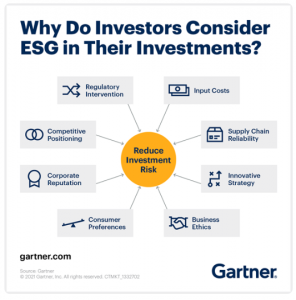More newsworthy than ever, since the pandemic, the so-called ESG (Environmental, Social, and Governance) is one of the hottest topics in any organization, any industry. No surprise, ESG investing continues to soar in 2022.
Did I tell you I work for a company that has a solar farm, bees and sheep? No? Ok, not the point anyway. There is so much more. ESG is not all about carbon footprints and climate risks. From an investor’s point of view, ESG factors are a way to evaluate companies, with non-financial factors. It’s all about risk management and growth opportunities.
In 2021, ESG has become mainstream. Environmental, social, and governance ambitions gained traction across the board. Those 3 factors are now an eye-watcher on how far advanced the companies are with sustainability and social impact. According to McKinsey research on the « Five priorities for CEOs in the next normal » - September 2021, having a center strategy on sustainability is the first TOP priority. ESG is rocking the worlds of finance and investing too. Bloomberg Intelligence estimates that “Assets are poised to reach $41 trillion by the end of this year.”. In 2022, ESG will turn innovative to live up to those expectations. It has to. Let’s see why and how.
“More companies, and their investors, are recognizing sustainability as a strategic priority that involves significant business risks and opportunities.” McKinsey, Five priorities for CEOs in the next normal, September 2021”
#Why It Matters: a win-win situation
Amid inflation and supply chain disruption, the Covid-19 pandemic has been a tipping point. Investors and companies have felt a sense of urgency to update their investment risk management strategies and processes.
More than half of the corporate studies demonstrate a positive relationship between ESG and the financial performance. When companies disclose ESG actions, and stakeholders engage on ESG matters, then loyalty is the outcome, and loyalty drives competitive advantage. A virtuous circle, let’s say. However, we’re not there yet.

There are major challenges the companies have to tackle on to stay ahead of ESG measurements.
#Challenge 1 : lack for (good) data
ESG data is the key. There are a lot of data. But does all this data is accurate enough to help to measure the ESG criteria in the companies' portfolios and feed the investment decision-making process? Probably not. There is massive structured and unstructured data, scrappy data, real-time data, images, PDFs buried in many different applications. These data have to be filtered and analyzed to extract the insightful information.
There is no trusted ESG dashboard without a trusted ESG data repository and a truly effective data management process. However, the research shows that fewer than half (46%) have a fully deployed and sophisticated approach to data management, with a central ESG data repository. Security, resilience, cost efficiency and effectiveness will be the heart of a sustainable data platform which ensures data quality, traceability and accessibility.
#Challenge 2 : greenwashing
The historical lack of global standardization of ESG metrics has led to suspicions of greenwashing where a company appears more ESG-friendly than it is. Greenwashed and self-provided biased data must be identified by an early detection system to provide the deserved quality and transparency of corporates’ ESG data analysis.
Unfortunately, regulations are not unified across the market: European Union, US, Asia Pacific might come with different regulations. As the ESG scorecards are not standardized yet, it is therefore, very difficult to make objective assessments. As most have pledged for a clearer regulatory landscape, some initiatives and even task forces are being launched to identify ESG-related misconduct, so that players will be forced to disclose correctly information.
#Challenge 3 : lack of governance
Let’s use the Climate part as an example. If the net-zero race is a paramount concern, it's more complex than it looks. It’s not just about a dashboard of your carbon emissions. Without governance, you cannot complete your ESG strategy. What are the risks you are exposed to if you miss your target? How do you embed this entire governance into your business and make sure that in 5 years it will be reduced by x%? How do you respond to regulators, to be in line with the COP 21 event and the Paris Agreement and provide your natural commitments?
# Why AI the answer?
AI helps to overcome the challenges mentioned above and is a real accelerator in achieving the ESG goals. Companies that can leverage out of the box capabilities through an Advanced Analytics & AI solution, will be the next key players, when it comes to the ESG race:
- Automate the data collection
Computer Vision (CV) and Natural Language Processing (NLP) will turn unstructured and messy data into key indicators. CV and NLP capabilities will generate valuable structured data from millions of unstructured data (invoices, utility bills, purchase orders, streaming real-time data related to consumptions …), then classify them by topics, through an enterprise-wide taxonomy, extract business concepts and metrics to compute the key ESG-indicators automatically.
- Data Analytics add a degree of accountability: quality and transparency
AI will help the investors or regulators create data on a company. Data crawling and NLP will dig into data that may exist outside of a company’s formal ESG: nongovernmental organizations, analyst research, blogs and social media, research papers and analysis… The use of alternative data can help identify risks and opportunities for ESG investments. Tracking ESG data from the news or company disclosures such as annual reports - thanks to NLP advanced extraction capabilities- could also help find answers to some ESG-related controversies.
The use of AI and Machine Learning to estimate the ESG factors is still underexplored. However, the benefits are real. NLP & Machine Learning to transform textual data into numerical data and Sentiment Analysis techniques to extract the tonality of articles will produce valuable potential predictive indicators for assessing long-term risks.
What if AI becomes the playground for ESG investment? By leveraging algorithms to reduce human bias and apply an early-warning system, AI and Data analytics capabilities produce reliable ESG performance reports.
- Forecasting, optimization and IoT capabilities
With IoT sensors connected and real-time data streaming capabilities and alerts, the energy consumption of your assets can be monitored and optimized (different targets for different lines of business can be set). So you will be alerted by unusual consumption behaviors.
The latest AI-driven methodology forecasts ESG parameters (like energy consumption..) based on the forecast of the most relevant variables and take into account add external variables (i.e. weather forecast). Then realistic goals could be set with higher precision and granularity to have more reliable and achievable net zero commitments.
- Intelligent monitoring and stress testing
How to make sure that the impact of your project is embedded into your business and assessed in a proper way ? By creating a real internal ESG Rating model and using it in your decision-making process.
An end-to-end approach needs to be built, from data collection, real time streaming to AI-driven scoring to address all the important aspects of ESG: Metrics and Targets, Strategy, Risk Management and Governance.
The automation of your ESG reporting and near real-time analysis will help you to understand the factors that determine your ESG score, without having to wait the next weekly or monthly report. As the ESG reporting rules are still unclear, a system with a high degree of flexibility is mandatory to be able to evolve to future requirements. Once a global standardized disclosure framework is defined, a system with Risk and Compliance Management capabilities, will help oversee ESG.
Your journey
An AI-driven ESG management and reporting tool is a key success factor. Leveraging advanced analytics and AI capabilities will bring transparency and accountability by analyzing more information than ever before when accounting for ESG risks and opportunities. However, nothing can be done overnight…
So, holistic or focused? resilient or inflexible? shy or bold? traditional or innovative? brand new, ongoing, not there yet? … how could you describe your ESG approach so far?
#ESG #sustainability #AI #Advanced Analytics

